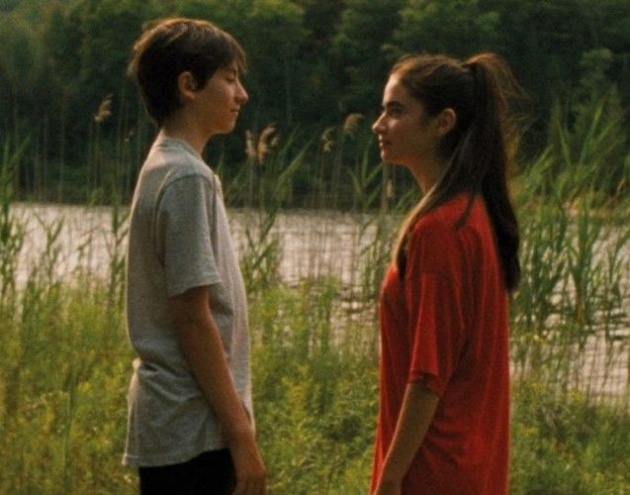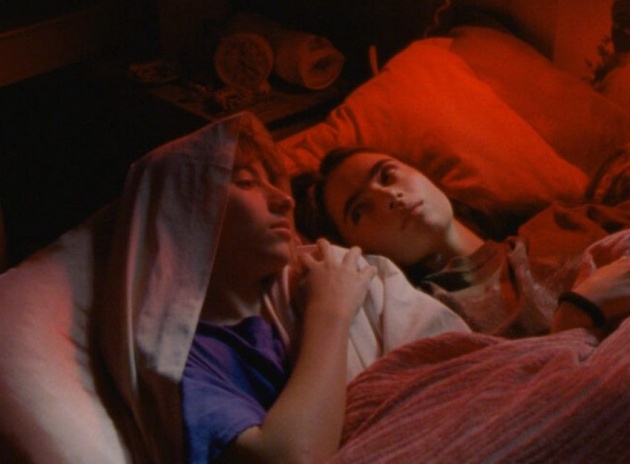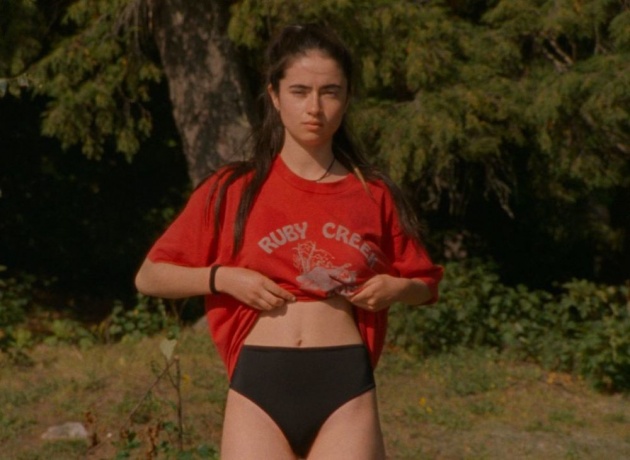
Pictured: Bastien (Joseph Engel) and Chloé (Sara Montpetit) close their eyes to exchange worst fears in the teenage romance, 'Falcon Lake', adapted from Bastien Vives' graphic novel and directed by Charlotte Le Bon. Still courtesy of Tandem Film Distribution (France)
Contains spoilers
It has been a while since I have heard a logo cheered unironically in a cinema. That is what happened at Cannes this year when Tandem ™ appeared at the start of actress-turned-director Charlotte Le Bon’s debut feature, Falcon Lake. The cast and director of this French-Canadian film were in attendance but that didn’t account for the enthusiasm shown within the first twenty seconds of the film for the distribution company, whose releases include Sound of Metal and Un Monde (Playground). Clearly, the crowd was partisan and more or less guaranteed a five-minute ovation as the credits rolled. I told myself: ‘it’s Cannes. It’s not real life.’ I had the opportunity to watch the film again without English subtitles. The scene that drew a huge laugh the previous day didn’t wow the French audience at a Cannes Cinéphiles screening, a high percentage of whom were over sixty. The applause was modest, but an English speaker around my age, sensing my nationality from my Glasgow Film Festival tee shirt, told me that he found it exquisite. When a film prompts a viewer to emote to a stranger, you know it has something.
Le Bon is a young (36-year-old) French-Canadian actress turned director who has appeared opposite Helen Mirren in The Hundred Foot Journey, Joseph Gordon-Levitt in The Walk and Guillaume Canet in Arctic Heart. She had previously directed a short, Judith Hotel. Falcon Lake takes its title from the body of water located in the Whiteshell Provincial Park 152 miles east of Winnipeg where an alleged UFO was sighted on May 20, 1967. I was glad that the film didn’t screen on the 55th anniversary of that event, otherwise I would have missed it. At any rate, there is no reference in the film to the so-called ‘Falcon Lake Incident’. What we are told instead, by one of the characters, is that there was a drowning. Soon afterwards, another character runs from the water: ‘oh my God, something touched my leg and grabbed my penis’.
Le Bon and her co-writers Karim Boucherka and François Choquet have adapted Bastien Vivès’ 32-page ‘roman graphique’, Une soeur (‘A Sister’), a coming-of-age story whose protagonist is a 13-year-old boy vacationing with his parents and younger brother at the seaside who meets a girl, whose mother spends time with the boy’s family. Le Bon has changed the names of some of the characters and the location in a film described as a ‘love and ghost story’ that moves out of naturalism in its final scenes, a shift that is signposted well in advance.
The first image is of a tranquil section of the lake in which we see a body – we cannot tell whether it is male or female – floating face down. There is a sudden movement as a head is lifted. A young woman, who had placed her head underwater, feigning death, swims to the tree-lined shore.
Cut to a car speeding down a road. Mother and father in front, thirteen-year-old Bastien (Joseph Engel) and his younger brother Titi (Thomas Laperriere) in the back. Wearing headphones, Bastien stares out of the window looking at the trees as they whizz by. He turns and looks at his brother, who has tissue stuck up one nostril, plugging a nosebleed. Bastien runs his finger down Titi’s nose with affection. The nosebleed, we sense, means that Titi won’t irritate Bastien so much. They pull up outside an old cabin. The lights won’t switch on. Apparently, this happens often. Eventually electricity is restored. Bastien’s mother is joined by an old friend, a realtor, who we later discover has a teenage daughter and owns the cabin. Bastien and Titi occupy the bunk beds, Titi gets the top bunk.
Bastien sits on the edge of a short pier by the lake with his headphones on. As we discover, he has a thing about water, owing to a childhood trauma. His hesitancy is symbolic, indicating a general uncertainty about sex. At night, there is a storm. As lightning flashes, we see the profile of a girl’s head, introduced as if in a horror film. Meet Chloé (Sara Montpetit).
The next day, Chloé rushes in and out, not listening to her mother – typical teenage behaviour - who then her mobile phone confiscated. Bastien views her with a mixture of humour and fear. At the pier, Chloé occupies his spot right at the edge, while Bastien sits on a lounger. Titi approaches him with a stone. Bastien encourages him to collect others, especially small ones, they are ‘expensive’. (I think the translator meant ‘valuable’.) Bastien walks over to Chloé and hands over a can of Pepsi. ‘You can drink it, if you like,’ he says as if addressing a terrifying monster, who could turn on him at any moment. ‘Do you often tell your little brother lies to send him away?’ Chloé asks. ‘Yes,’ replies Bastien. Although Chloé appears to disapprove of such behaviour, she responds to Bastien’s honesty. She asks him if he has a mobile phone. Bastien says he will only get one for his fourteenth birthday. At the end of the scene, he passes her one, having initially lied.
The family takes a motorboat ride out to another house on the lake and meet an English speaker, Bryan (Jeff Roop). Bryan has been making his own wine. ‘Not quite Chateaubriand,’ he explains. ‘No, Chateau-Bryan,’ explains Chloé’s mother. Bryan thinks it is pretty damned good, though when Bastien’s parents try it, they cough.
Bastien is watching an anime with his brother and another young boy when Chloé appears from nowhere, again like a figure from a horror movie. In the show, the male protagonist bites his hand, which then releases a burst of energy. This causes Bastien to laugh. ‘Do you often hang around with little kids?’ Chloé asks, by implication asking him to join her.
The pair go out for a walk towards the lake. Le Bon holds the shot before Bastien and Chloé walk into frame just slightly longer than necessary, drawing attention to the empty space. This is the first time Le Bon hints at the possibility of absence, exercising a command of atmosphere. Bastien speaks derisively of the anime. ‘No one could bite their hand to the extent that it would bleed,’ Bastien insists. ‘The pain would stop you from doing so.’ Throughout the rest of the film, Bastien intermittently bites his hand, testing his theory. His tolerance for self-inflicted pain is higher than he expects – again a precursor of what is to come.
At the lake, Bastien begins to relax with Chloé. Swigging from a bottle of wine – Bastien only takes small sips - she tells him that someone died in the lake; the camera pans to the left to indicate where the fatality may have occurred. Two older boys come up behind them. One of them is Oliver (Anthony Therrien), who is Bryan’s son. He introduces Chloé to ‘the new guy’. They talk about Chloé’s boyfriend, now her ex, Jackson (Jacob Whiteduck-Lavoie). They go into the water – a clear reference to their sexual confidence – while Bastien watches from a distance. As one of them claims to have been grabbed, Bastien leaves. He wanders through the undergrowth as he starts hearing a scream. He continues in a more uncoordinated, panicked way, until Chloé rushes up behind him.
Bastien likes to be around Chloé but is naturally uncomfortable around older boys. He learns that Chloé dumped Jackson after he claimed they had sex. Chloé is in fact a virgin. Nevertheless, Chloé inspires Bastien to express her sexuality, at least verbally – he’s a look, don’t touch kind of kid. In one scene, after Bastien has vomited from taking unhealthy gulps of red wine, she invites him to wash in the bath, wearing only his shorts. The invitation is shown from a distance, with Bastien, then Chloé shown through a doorway. Once Bastien is in the bath, Chloé gets in with him. Bastien is transfixed by shampoo as it pours from her hair onto the straps of her bikini. Later, he will tell her that he is attracted to girl’s hair, ‘especially blondes.’ Chloé is a brunette.
Chloé invites Bastien to a party and asks her to find her black top. Bastien rifles through the clothes on Chloé’s bed with uncertainty. Chloé comes into find it herself, stripped to her underwear. She is completely unself-conscious around him. She is also critical of his dress sense, offering him a striped tee-shirt. ‘I’ll look like a tourist,’ Bastien grimaces, apparently resembling a stereotypical French Canadian. By this time, they have played the ‘what are you most afraid of’ game, Bastien explaining that he is most afraid of his parents’ finding him jerking off. During the party, Bastien drinks beer for the first time. Chloé is invited to join Oliver and the older boys. Once again, Bastien is made to feel insignificant. There is a point though when he dons a white mask and shows his prowess on the dancefloor, spinning around. Everyone, including Chloé, is transfixed and impressed. Once more, though, he leaves Chloé behind. This time, she doesn’t rush behind him.

Pictured: 'About that worst fear of yours.' Chloé (Sara Montpetit, right) puts Bastien (Joseph Engel) to the test in a scene from the coming of age drama, 'Falcon Lake', directed by Charlotte Le Bon. Still courtesy of Tandem Film Distribution (France)
Chloé does however creep into bed and starts talking to Bastien. Titi (on the top bunk) stirs. To ensure her voice remains lowered, Chloe invites Bastien into her bed. (Cue laughter from the Cannes audience.) Chloé decides to test Bastien’s greatest fear by rolling onto her stomach, simulating an orgasm and calling her mother. Bastien leaps out of bed and rushes into a cupboard. Chloé’s mother appears. ‘What is it?’ ‘Nothing.’ (Cue huge laughter and applause.)
Chloé appears to accede to Bastien’s request to look at her breasts and has him walk backwards in the water while she stands on dry land lifting her red Ruby Creek Tavern shirt. Chloé tantalises him as he walks backwards, his mouth and eyes going underwater. When his head is above water, Chloé has stepped away.

Pictured: Chloé (Sara Montpetit) tests the resolve of new best friend Bastien (Joseph Engel) in a scene from the teenage coming of age drama, 'Falcon Lake', directed by Charlotte Le Bon. Still courtesy of Tandem, Film Distribution (France)
Chloé and Bastien do have a moment of intimacy in which they rub against each other, while standing up. It is unclear whether fluids are exchanged, but sexual tension is replaced by easy foolery – wrestling in the grass and Chloé throwing food into Bastien’s mouth. However, Bastien casually admits to Oliver that he and Chloé have had sex. Oliver texts Chloé. Chloé explodes with rage, calling Bastien a liar.
In the climax, relations between Chloé and Bastien are strained. A group of kids including Oliver are by the lake. Oliver is asked to swim to his dad’s house to get more wine. All the kids strip and get into the water, except Bastien. They call to him, but he hesitates. After they disappear from view, Bastien takes off his trousers and gets into the water.
The finale is low-key and non-naturalistic. The very last shot has a certain predictability, a call, a half response and a cut to black.
Engel and Montpetit carry the film. Although Chloé appears to be a young boy’s fantasy of a girl who gives Bastien some form of sexual initiation, Montpetit makes her credible. Chloé is disappointed by older boys who treat her as a trophy and prefers a relationship of equals, at least one where she exercises some control. It is also credible that the adults let the kids find their own entertainment – though I expected at least one scene where they drive to re-stock the refrigerator. There is a sense that the parents facilitated their children’s sexual experimentation, allowing them to make their mistakes in an idyllic setting. There is only one scene in which Chloé and her mother argue.
There is also sense that English-speaking Canadians are less sensitive than their French-speaking counterparts; a linguistic point this shares with the Gaelige language film, The Quiet Girl. Certainly, both films were made at a time when English speaking countries – New Zealand aside – exercised populist boorishness and an intolerance of outsiders.
Falcon Lake doesn’t break new ground in coming-of-age tragedies, but it does ‘flip the script’ in its ending. It certainly captures the tension in teenagers – and those slightly older – between emotional attachment and desire. True love may be an illusion, but some couples seem more comfortable in one another’s company than others. That might not be love but speaks to the importance of fidelity.
Reviewed at Croisette Theatre (ex-Noga Hilton), Cannes, Côte D’Azur, France, Sunday 22 May 2022, 17:45 screening. Also Theatre Licorne, Cannes La Bocca, Monday 23 May 2022, 14:00 Cannes Cinéphiles screening (no English subtitles).



